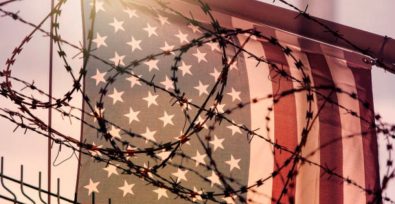As part of the Women and Foreign Policy program’s Democracy, Corruption, and the Fight Against Human Trafficking Project, Melissa I.M. Torres was interviewed on new approaches to tackling human trafficking along the U.S.–Mexico border. See the original interview here.
Not only migrants are affected
Torres emphasizes that the scope of understanding who is vulnerable to human trafficking is too narrow. Human trafficking at the U.S.–Mexico border is an issue that is not limited to migrants and cartels, but also the communities living along the border. In fact, she states that those living on the U.S. side are among the most vulnerable to trafficking. The biggest proponent of being vulnerable to trafficking is poverty. Torres explains that there needs to be an increased focus on systemic causes and protections against human trafficking like poverty alleviation, better education, and health care systems.
“The borders are only looked at like some kind of immigrant territory. But it is a binational community where people are suffering.”
Normalization of exploitation leads to high figures of unknown trafficking cases
A significant problem is the lack of understanding of human trafficking among migrants, border communities, and personnel working in the area. Torres highlights the need to consider language and cultural context. Furthermore, exploitation has become so normalized in migrant communities that it is not considered a crime. Coming from situations that are often even worse, many don’t see another choice than to take a low-paying job, as it is better than no job.
We need to do a much better job building awareness about the actual crime of trafficking so that more people understand when it is happening.
Torres also shares that the notion of ‘illegal’ immigrants leads many victims to believe they have no rights and don’t seek justice. Instead, they put up with the exploitation, and their cases go unnoticed.
Another factor to consider is that many unaccompanied minors are often sent to the U.S. to work and return money to their families. Upon arriving in the U.S., many are put in situations where, in addition to going to school, they need to pay for necessities like food and rent. The expectations of these child migrants are extremely large and culturally complex. Instead of prohibiting children from working and thereby forcing them to find alternative means, leaving them vulnerable to exploitation, there needs to be fair labor opportunities for them.
Lack of focus on labor trafficking
Lastly, Torres criticized a lack of protection mechanisms and services for victims of labor exploitation. Thus, the existing systems often focus on sex trafficking, even though the majority of identified children in the region are trafficked into labor exploitation. Furthermore, and related to this, men are often left behind as many shelters don’t take them in.
Torres also stressed that the government needs to do more to ensure migrants and border communities are protected from human trafficking. You can help by signing our petition for genuine anti-trafficking policies here!







Freedom United is interested in hearing from our community and welcomes relevant, informed comments, advice, and insights that advance the conversation around our campaigns and advocacy. We value inclusivity and respect within our community. To be approved, your comments should be civil.
The open border policy of the actual administration is causing these atrocities.
Dovrebbe essere stato sottolineato il fatto che l’amministrazione Biden-Harris ha aperto i confini, lasciando entrare oltre 20 milioni di ILLEGALI, favorendo in questo modo la tratta di esseri umani. In particolare la signora Harris, nella sua posizione di “Border Czar”, è la principale responsabile di questa catastrofe.